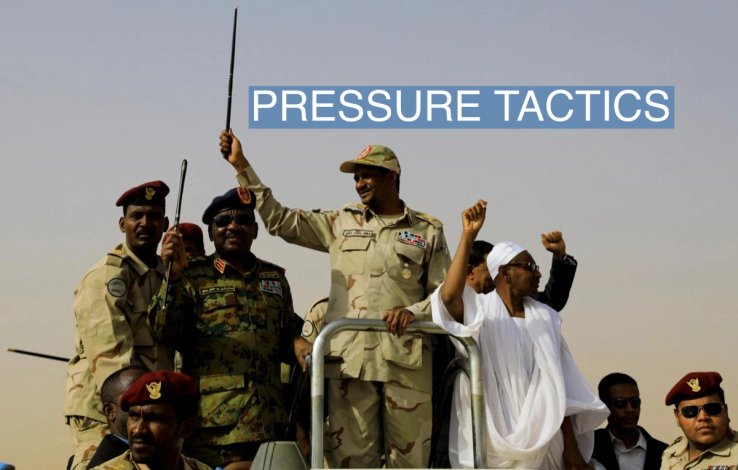The Scoop
The Biden administration is deliberating over whether to impose sanctions on Sudan’s two feuding generals in a bid to pressure them into abiding by a permanent ceasefire and prevent the country from sliding further into civil war.
A number of current and former U.S. officials who work on Sudan said they’re deeply skeptical that either military leader will give up their fight, which has led to hundreds of deaths, without significant outside pressure on their personal finances, as well as on the businesses controlled by their military units. But Biden administration members are uncertain about whether the U.S. can count on key Middle East governments to help enforce the sanctions.
These policy discussions, described by current and former U.S. officials, come as representatives from the generals’ two warring factions — the Sudanese Armed Forces, or SAF, and the Rapid Support Forces militia, or RSF — are meeting in Saudi Arabia this week to identify ways to allow humanitarian aid into the country. The SAF and RSF have both stated publicly that the U.S- and Saudi-backed talks aren’t about a cessation of hostilities.
Last week, President Joe Biden signed an executive order that authorizes his administration to sanction “individuals responsible for threatening the peace, security, and stability of Sudan.” A U.S. official involved in sanctions policy said the executive order is designed as a clear “warning” to Abdel Fattah al-Burhan, who leads the SAF, and Mohamed Hamdan Dagalo, known as Hemedti, who commands the RSF, that they need to move quickly to enact a permanent ceasefire. The United Nations has expressed concerns that a protracted Sudanese civil war will destabilize North Africa and send refugees fleeing into Egypt, the Gulf states, and Europe — a process that’s already started.
The SAF and RSF control hundreds of businesses in Sudan that touch on every sector of the economy, from banking and agribusiness to transportation, according to U.S. officials and outside analysts. General Hemedti and his family also own numerous gold mines in Sudan’s Darfur region. Both men are believed to have stashed significant portions of their financial resources, as well as their military units’, outside Sudan, primarily in the UAE and Saudi Arabia, making them potentially vulnerable to sanctions and asset seizure.
However, U.S. officials are still trying to determine whether they would be able to enlist the help of Abu Dhabi and Riyadh in a potential pressure campaign. Both governments have close ties to Burhan and Hemedti and have expressed skepticism that sanctions will work, according to U.S. and Arab officials.
Ernst Hogendoorn, who served as the State Department’s senior policy advisor on Sudan up until February, said that the Biden administration would need to ensure Saudi and Emirati support in order for the sanctions to succeed, and that the U.S. couldn’t expect their “automatic” participation.
“The United States would then have to go to those countries and say, you know, we’ve imposed sanctions on these individuals, we would like you to do the same,” Hogendoorn said.
In this article:
Jay’s view
Both the Trump and Biden administrations have struggled with how to handle Sudan since a popular uprising toppled its long-serving dictator, Omar al-Bashir, in 2019. Washington maintained sanctions on the country’s government for decades due to its support for international terrorist groups such as al-Qaida. It unwound them after Bashir’s overthrow and committed billions of dollars in financial assistance to Khartoum in a bid to promote a transition to civilian and democratic rule.
Those rebuilding efforts were undermined by the military’s longstanding chokehold on Sudan’s politics and economy. After Bashir’s downfall, the country established a Transitional Sovereign Council that was partly tasked with breaking up the military’s many business interests. The body has been led by Burhan and Hemedti, and included the former prime minister. But the generals ultimately balked at both economic and security reforms, and chose to overthrow Sudan’s civilian leadership in 2021.
The coup set off a debate inside the U.S. government over whether to sanction Burhan and Hemedti, according to participants, with the Biden administration ultimately ruling against it. A number of participants now believe this was a mistake, though they say it’s unlikely sanctions would have stopped the two generals from turning their guns on one another.
“We should have insisted on a harder line,” said one senior U.S. diplomat who took part in the debate. “Do I think this would have prevented what’s happened? Probably not.”
Room for Disagreement
The UAE and Saudi Arabia are skeptical that sanctions will work against the Sudanese generals and fear these penalties could contribute to a further disintegration of the country’s economy. The United Nations says the current conflict could leave 2.5 million people without feed and water, and fuel the mounting refugee crisis. Saudi Arabia announced $100 million in additional aid to Sudan last week.
Saudi Arabia and the UAE also worked closely with Generals Burhan and Hemedti to prosecute their war in Yemen over the past decade. Both the SAF and RSF dispatched troops to fight against Houthi rebels there. And Abu Dhabi and Riyadh see the generals as allies in pressing back against Islamist terrorist groups, like the Islamic State and Boko Haram, active in Africa’s Sahel region.
A senior Arab official involved in talks with the Biden administration told Semafor: “A ceasefire will happen when the two parties are ready. Not when outside parties decide.”
Notable
- The SAF and RSF sent as many as 40,000 troops to fight alongside Saudi Arabia and the UAE in Yemen before beginning to draw down in 2019, the Associated Press reported.
- Sudan’s conflict risks spilling into Chad and other countries in Africa’s Sahel region, potentially growing the ranks of Boko Haram, Islamic State and other terrorist organizations.


